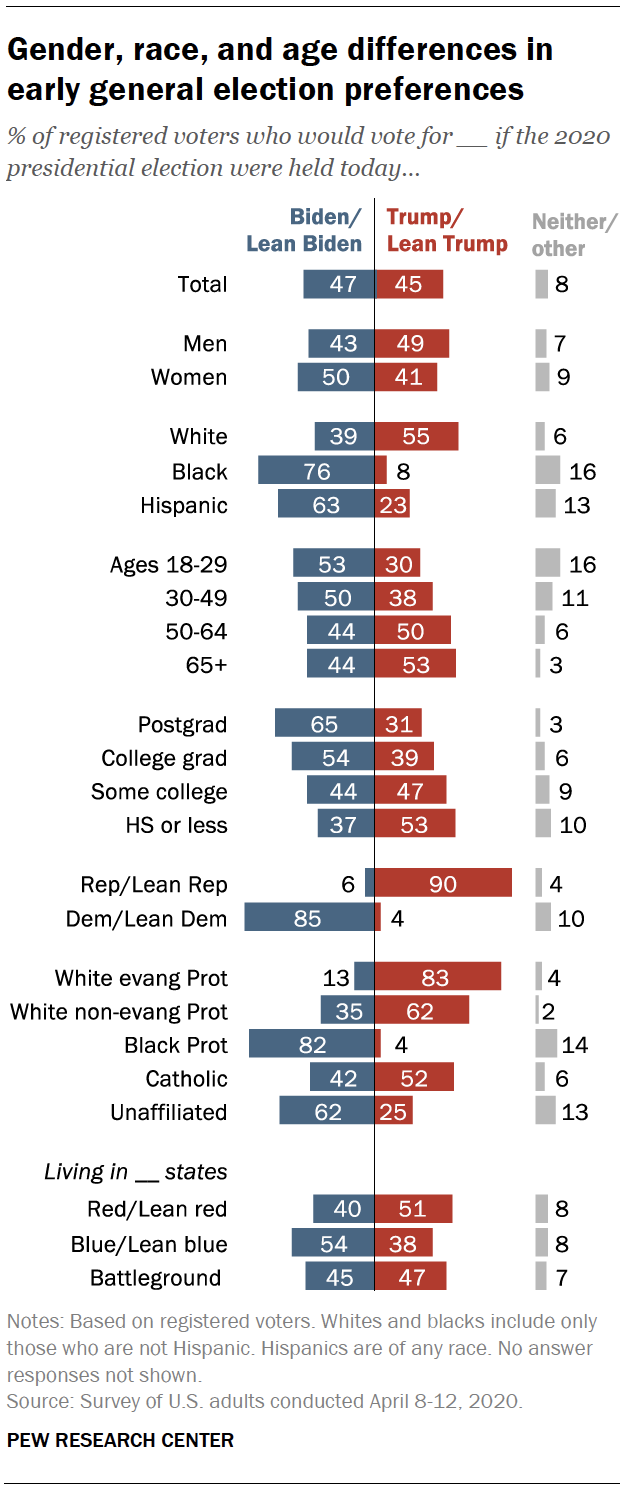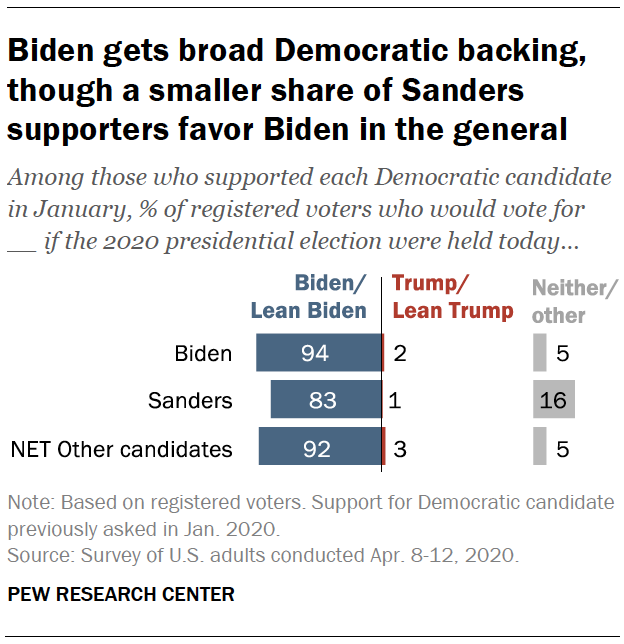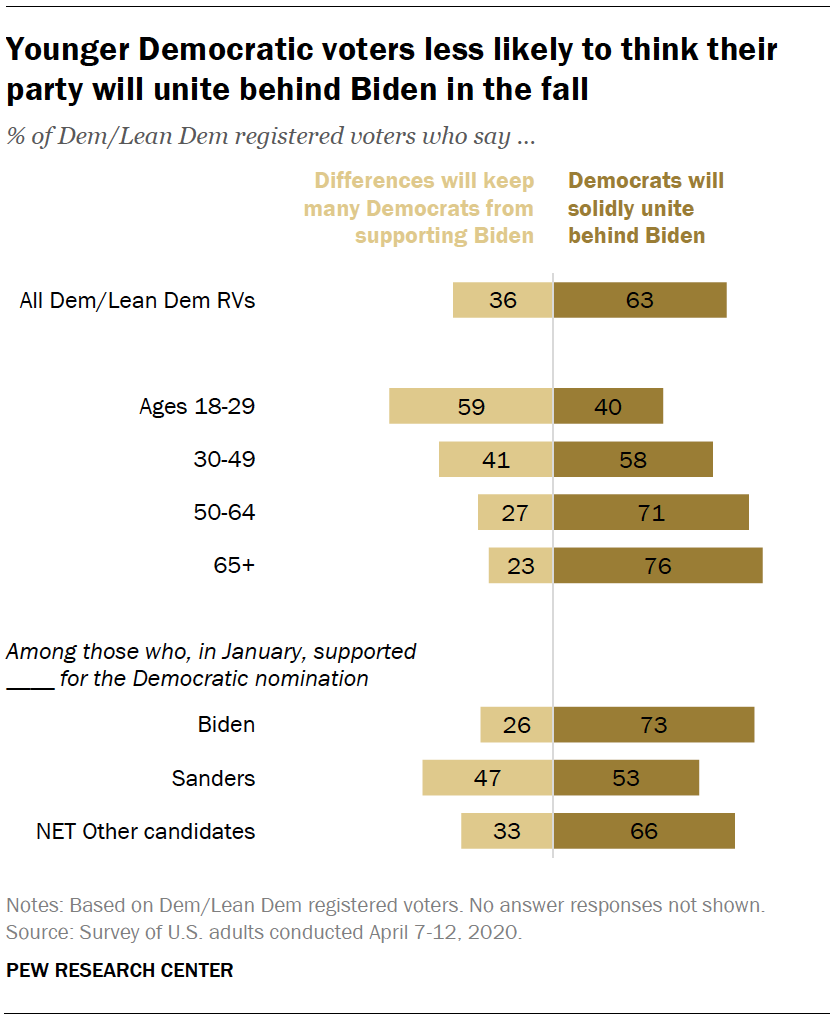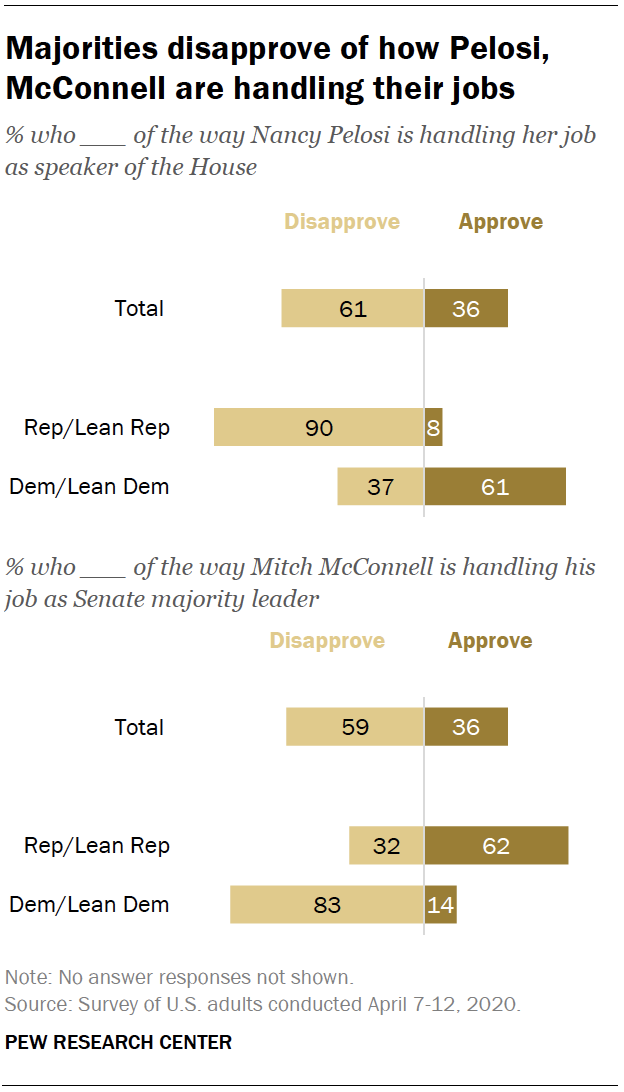 With about seven months until the general election, similar shares of registered voters say they would vote for Joe Biden (47%) or Donald Trump (45%) if the election were held today; 8% of voters say they wouldn’t vote for either or would vote for someone else.
With about seven months until the general election, similar shares of registered voters say they would vote for Joe Biden (47%) or Donald Trump (45%) if the election were held today; 8% of voters say they wouldn’t vote for either or would vote for someone else.
At this very early stage of the general election campaign, the demographic patterns in preferences in recent elections are evident in the Trump-Biden contest.
Trump has a slight advantage among men (49% to 43%), while Biden leads among women (50% to 41%).
Slightly more than half of white voters say they would vote for Trump (55%), while black and Hispanic voters are overwhelmingly likely to say they would vote for Biden if the election were held today (76% and 63%, respectively).
Younger voters are more likely to support Joe Biden: 53% of those ages 18 to 29 favor Biden, compared with 30% who support Trump; a relatively large share of young voters (16%) support neither candidate or another candidate. Biden also leads among voters ages 30 to 49, while Trump has an advantage among voters age 50 and older.
Nearly two-thirds of voters with a postgraduate degree (65%) say they would vote for Biden, and 54% of those with a four-year degree say the same. Among those with some college experience, roughly similar shares say they would vote for Trump or Biden (47% vs. 44%). Those with no college experience are much more likely to say that they would support Trump (53%) than Biden (37%) in November.
 Republican and Democratic voters overwhelmingly favor their party’s candidate. Trump holds an early advantage in Republican-leaning states, while Biden has an even wider lead in Democratic-leaning states. In battleground states, neither candidate has an advantage (47% prefer Trump, while 45% favor Biden).
Republican and Democratic voters overwhelmingly favor their party’s candidate. Trump holds an early advantage in Republican-leaning states, while Biden has an even wider lead in Democratic-leaning states. In battleground states, neither candidate has an advantage (47% prefer Trump, while 45% favor Biden).
Biden draws somewhat less support among Democratic voters who, in a January survey, named Bernie Sanders as their first choice for the nomination (83%) than among those who originally preferred Biden (94%) or other Democratic candidates (92%). Nearly all of those who supported Sanders in the earlier survey and don’t currently back Biden in the general election currently say they don’t support either of the two major party candidates (just 1% of Sanders’ January supporters say they’ll vote for Trump).
With Joe Biden as the presumptive Democratic nominee for the 2020 presidential election, a majority of Democrats expect the party to rally behind him ahead of the general election in November.
About six-in-ten Democratic and Democratic-leaning registered voters (63%) say they expect the Democratic Party will solidly unite behind Biden in the presidential election. Still, 36% of registered Democratic voters say that differences and disagreements within the party will keep many Democrats from supporting him. In a similar question in March 2016, 64% of Democratic registered voters said they expected that the Democratic Party would unite behind Hillary Clinton if she became the nominee, and roughly the same share said this of Barack Obama in 2008.
 Although there are no significant racial, educational or ideological differences in the shares of Democrats who say their party will unite behind Biden, younger Democratic voters are far more likely than older voters to say disagreements will keep many Democrats from supporting Biden.
Although there are no significant racial, educational or ideological differences in the shares of Democrats who say their party will unite behind Biden, younger Democratic voters are far more likely than older voters to say disagreements will keep many Democrats from supporting Biden.
Democratic registered voters younger than 30 are the only group in which a majority does not expect their party to unite behind the presidential candidate: 59% say differences between members of their party will keep many Democrats from supporting Biden, while 40% say Democrats will solidly unite and back Biden.
By contrast, clear majorities of older Democratic voters believe Democrats will unite behind Biden in the fall. About seven-in-ten or more Democratic voters 50 and older say they expect Democrats to solidly unite behind Biden.
Democratic voters who named Biden as their first choice for the Democratic presidential nomination in a January survey, prior to the first caucuses and primaries, are especially likely to say that the party will unite behind the former vice president: 73% say they expect Democrats will coalesce behind Biden. By comparison, those who supported Sanders in the January survey are less certain the party will unite: 53% say Democrats will unite behind Biden, while 47% say differences within the party will keep this from happening. Among Democrats who backed other candidates (such as Elizabeth Warren, Pete Buttigieg, Amy Klobuchar and Andrew Yang) in January, 66% say Democrats will solidly unite behind Biden in the fall.
Views of congressional leadership
 Most Americans disapprove of the way the House speaker and Senate majority leader are handling their jobs. About six-in-ten (61%) say they disapprove of Nancy Pelosi’s job performance as speaker of the House, while roughly the same share disapproves (59%) of the way Mitch McConnell is handling his position as Senate majority leader. Just over a third (36%) say they approve of each of the leaders’ job performance.
Most Americans disapprove of the way the House speaker and Senate majority leader are handling their jobs. About six-in-ten (61%) say they disapprove of Nancy Pelosi’s job performance as speaker of the House, while roughly the same share disapproves (59%) of the way Mitch McConnell is handling his position as Senate majority leader. Just over a third (36%) say they approve of each of the leaders’ job performance.
About six-in-ten Democrats and Democratic leaners (61%) approve of the speaker’s performance, while 37% disapprove. By comparison, Republicans and Republican-leaning independents overwhelmingly give Pelosi negative ratings, with 90% saying they disapprove (just 8% say they approve).
Views of McConnell’s performance among Republicans are similar to Pelosi’s ratings among Democrats: 62% of Republicans and Republican leaners approve of the majority leader, while 32% disapprove. About eight-in-ten Democrats (83%) say they disapprove of the Senate majority leader’s performance.


 Data Tool: Survey Question on Trump's Response to COVID-19
Data Tool: Survey Question on Trump's Response to COVID-19